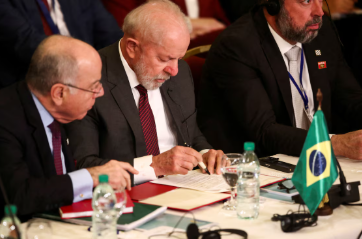Brazil’s Response to Potential US Tariffs: A Reciprocal Stance
In the ongoing discussions about international trade, Brazil has been vocal about its position on the imposition of tariffs by the United States. Brazil’s President, Luiz Inácio Lula da Silva, recently warned that any new tariffs imposed by the US would be met with reciprocal action. This warning comes amid heightened global concerns about trade wars, economic protectionism, and the broader impact of tariffs on global markets. Lula’s remarks reflect Brazil’s strong commitment to safeguarding its national interests and fostering fair trade practices in an increasingly interconnected global economy.
The Background of the US-Brazil Trade Relations
Trade between the United States and Brazil has historically been characterized by mutual interest in various sectors, including agriculture, manufacturing, and energy. The US is one of Brazil’s largest trading partners, and the economic relationship between the two countries is vital for both economies. However, trade relations have not always been smooth, with tensions arising due to tariff disputes, trade imbalances, and differences over certain industries.
Brazil has long been concerned about US protectionist measures, including tariffs on steel, aluminum, and agricultural products. While both nations have benefitted from bilateral trade, these trade disputes have been a source of friction, particularly in sectors where Brazil has a competitive advantage, such as soybeans, coffee, and beef.
Lula’s Position on Tariffs
Lula’s warning to the US about reciprocal tariffs is rooted in Brazil’s long-standing opposition to unfair trade practices. In his statement, Lula emphasized that any trade restrictions imposed by the US would be met with countermeasures designed to protect Brazil’s economic interests. This approach highlights Brazil’s desire to maintain a level playing field in international trade, ensuring that its industries are not unduly harmed by the imposition of foreign tariffs.
Brazil’s economy is heavily reliant on exports, particularly in the agricultural and mining sectors. As one of the world’s leading exporters of agricultural products, Brazil has a vested interest in ensuring that its goods can access global markets without facing unfair barriers. The imposition of tariffs by the US could jeopardize Brazil’s export-oriented industries, and Lula’s response signals his government’s commitment to counteracting such measures.
The Impact of Tariffs on Brazil’s Economy
The potential for new US tariffs poses a significant challenge for Brazil’s economy. The US is one of the largest importers of Brazilian goods, and any increase in trade barriers could negatively affect Brazil’s export revenues. Sectors such as agriculture, textiles, and steel could be particularly vulnerable to higher tariffs, potentially leading to reduced demand for Brazilian products in the US market.
Furthermore, the imposition of tariffs could have a ripple effect throughout the Brazilian economy. As the global market responds to trade restrictions, there may be shifts in supply chains, disruptions in the flow of goods, and increased costs for Brazilian producers. This could lead to inflationary pressures, job losses, and a slowdown in economic growth. For Brazil, maintaining access to US markets without the threat of tariffs is critical to sustaining its economic recovery and development.
The Role of Reciprocal Tariffs
Reciprocal tariffs are a strategy often used by countries to retaliate against perceived unfair trade practices. By imposing tariffs on imports from the offending country, the retaliating nation seeks to encourage negotiations or force the offending country to reconsider its position. In Brazil’s case, the threat of reciprocal tariffs serves as a strong signal to the US that Brazil will not passively accept measures that harm its economy.
However, the use of reciprocal tariffs is not without risks. Trade wars can escalate quickly, leading to broader economic consequences, including higher prices for consumers and disruptions to global supply chains. While Brazil’s stance is understandable given its economic priorities, it is important for both countries to engage in dialogue to avoid the negative consequences of escalating trade tensions.
Diplomatic Efforts to Avoid a Trade War
Despite Lula’s firm stance on reciprocal tariffs, Brazil has expressed a willingness to engage diplomatically with the US to resolve trade disputes. Lula’s government has emphasized the importance of cooperation and dialogue in addressing trade imbalances and tariff issues. In this context, Brazil seeks to work with the US to find mutually beneficial solutions that avoid the need for retaliatory measures.
Brazil’s approach to international trade is rooted in a broader vision of economic integration and multilateralism. Lula has consistently advocated for a fairer global trading system that benefits developing countries and promotes equitable economic growth. Brazil’s stance on US tariffs is part of this broader commitment to ensuring that trade policies are fair and just, particularly for countries in the Global South.
The Future of US-Brazil Trade Relations
Looking ahead, the future of US-Brazil trade relations will depend on the ability of both nations to navigate their differences and find common ground. While the threat of tariffs may continue to loom, both countries have much to gain from maintaining a strong and cooperative trading relationship.
Brazil’s growing role in global trade and its position as a leading exporter in key sectors mean that it is likely to remain an important partner for the US. On the other hand, the US’s role as a global economic leader ensures that its policies will continue to influence trade patterns across the world. By engaging in dialogue and negotiating fair trade agreements, both countries can help to foster a more stable and mutually beneficial economic relationship.
In conclusion, Lula’s warning about reciprocal tariffs underscores Brazil’s determination to protect its economic interests in the face of potential US trade restrictions. As the global economic landscape continues to evolve, both countries must find ways to navigate their differences and prioritize collaboration over confrontation. The future of US-Brazil trade relations hinges on their ability to balance competition with cooperation and ensure that trade policies are mutually beneficial for all parties involved.


Leave a Comment